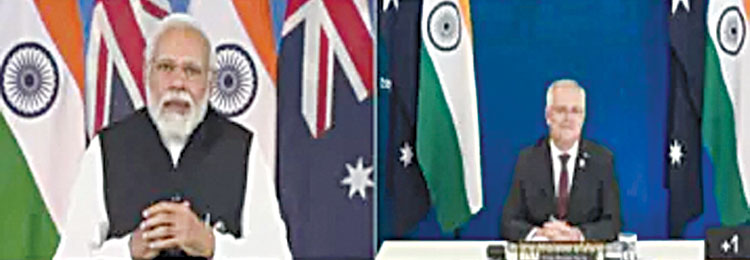New Delhi, March 22 (Representative) Prime Minister Narendra Modi and Australian PM Scott Morrison re-committed to concluding an Interim Comprehensive Economic Cooperation Agreement (CECA) at the earliest and work towards an ambitious full CECA by the end of the year, a joint statement issued on Tuesday said. The two leaders, who met on Monday for the second virtual summit, also welcomed the renewal of the India-Australia Memorandum of Understanding on Tourism Cooperation, which was inked in February during the visit of Trade Minister Dan Tehan. The two leaders emphasised the importance of an early resolution of the issue of taxation of offshore income of Indian firms under the India Australia Double Taxation Avoidance Agreement (DTAA). On clean energy, they welcomed the Letter of Intent between India and Australia on New and Renewable Energy Technology. They welcomed Australia’s funding contribution of $2 million to the International Energy Agency Clean Energy Transitions Programme to support enhanced IEA India activities and to progress a pathway to IEA membership for India.
They looked forward to India’s participation in the Sydney Energy Forum on clean energy supply chains in the Indo-Pacific to be held in July 2022. They reiterated their shared commitment to cooperation on critical minerals and building secure, resilient and sustainable critical minerals supply chains, and welcomed the signing of a MoU between India’s Khanij Bidesh Ltd. (KABIL) and Australia’s Critical Minerals Facilitation Office for joint cooperation on critical minerals projects. They welcomed the inaugural India-Australia Foreign Ministers’ Cyber Framework Dialogue held between Minister Marise Payne and EAM Jaishankar on 12 February. They reaffirmed their commitment to an open, secure, free, accessible, stable, peaceful and interoperable cyberspace and technologies that adhere to international law and condemned attempts to use cyberspace and cyber-enabled technologies to undermine international peace and stability. They welcomed the agreement to establish the India-Australia Centre of Excellence for Critical and Emerging Technology Policy in Bengaluru. They underlined the importance of India and Australia’s space engagement including Australia’s ongoing support of India’s Gaganyaan Space Program.
Prime Minister Morrison was pleased to announce a dedicated India stream of the Australian Space Agency’s International Space Investment initiative. On people-to-people links, PM Morrison announced the establishment of the Centre for Australia India Relations, to be based in Australia, in addition to the new Maitri Scholarships Program, the Maitri Grants and Fellowships Program and the Australia India Maitri Cultural Partnership. They welcomed the Letter of Intent on Migration and Mobility and called for early conclusion of a Migration and Mobility Partnership Agreement, which will support enhanced mobility for students and professionals. PM Modi welcomed the return of 29 artefacts by the Government of Australia. They welcomed the arrangement to establish a Taskforce on Education Qualifications Recognition, which will deliver a cooperative mechanism, within six months of its establishment, to improve arrangements for the recognition of qualifications (including those earned through diverse delivery modes) for access to higher education, and to support employment opportunities.
In security and defence cooperation, they welcomed the establishment of the General Rawat India-Australia Young Defence Officer Exchange Program. They looked forward to India’s participation in Australia’s Indo Pacific Endeavour exercise later this year. Recognising that terrorism remains a threat to peace and stability in our region, the Leaders strongly condemned terrorism in all its forms and manifestations and the use of terrorist proxies for cross-border terrorism. They agreed to continue to share information and coordinate on counter-terrorism efforts bilaterally, and in Quad consultations and in multilateral fora. On Ukraine, the Leaders expressed their serious concern about the ongoing conflict and humanitarian crisis in Ukraine. They reiterated the need for an immediate cessation of hostilities. They emphasised that the contemporary global order has been built on the UN Charter, international law and respect for sovereignty and the territorial integrity of states. They agreed to remain closely engaged on the issue and its broader implications for the Indo-Pacific. They expressed their shared commitment to a free, open and rules-based Indo Pacific, supported by a robust regional architecture, with ASEAN at its centre. The Leaders underscored their commitment to the cooperation between India, Australia, Japan and the United States on advancing the Quad’s positive and ambitious agenda to promote regional stability and prosperity. They looked forward to the next in person Leaders’ meeting in the coming months. Prime Minister Modi appreciated the briefing by Prime Minister Morrison on the Australia-UK-US (AUKUS) partnership.
Leaders recognised Australia’s commitment to not develop nuclear weapons and to uphold the highest standards of non proliferation, it said. The leaders underlined the importance of being able to exercise rights and freedoms in all seas and oceans of the Indo-Pacific region, consistent with international law, particularly the UN Convention on the Law of the Sea (UNCLOS), including freedom of navigation and overflight. They reiterated the importance of adherence to international law, particularly as reflected in the UN Convention on the Law of the Sea (UNCLOS), to meet challenges to the maritime rules-based order, including in the South China Sea, in reference to China. They committed to deepening the economic relationship under the Comprehensive Strategic Partnership, including through the Australia India Business Exchange. Prime Minister Morrison was pleased to refer to the launch of the Australia India Infrastructure Forum and Australia’s intention to open a new Consulate-General in Bengaluru and the announcement of new initiatives to drive two-way trade and innovation, including cooperation on standards, future skills and a new Australia India Innovation Network.

